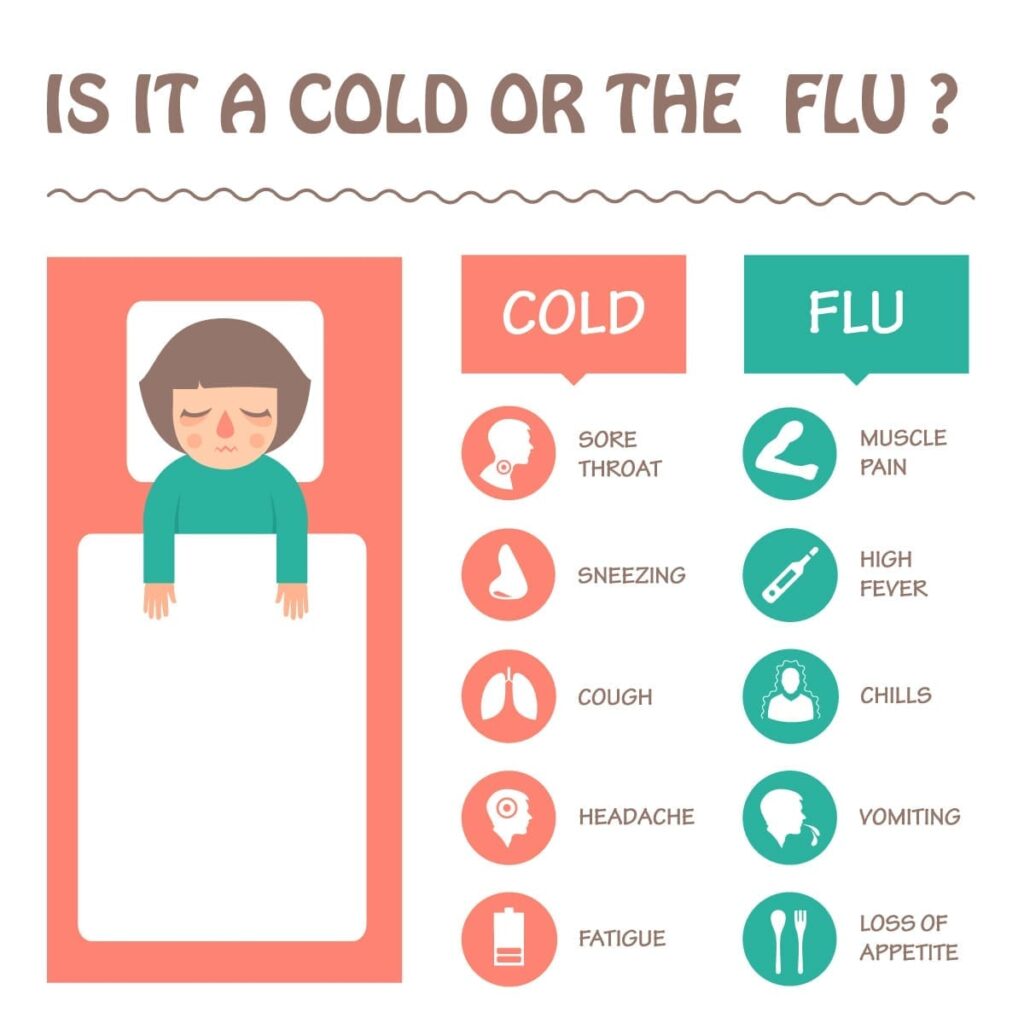The influenza virus causes flu, a disorder of the respiratory system. It mainly affects the nose, throat, and lungs. Main flu symptoms include sore throat, runny nose, cough, headache, body aches, and fatigue. Keep in mind that common flu is quite different from stomach flu, in which a person experiences diarrhea and vomiting also.
Flu is one of the most common viral infections that infect millions of people each year in specific seasons. Moreover, as it’s a viral disease, it is contagious and spreads quickly. Flu has many stages, and it doesn’t leave you within 1 or 2 days. This blog emphasizes its main stages and symptoms.
Four Main Stages of Flu
The stages and symptoms of flu vary from person to person. But mainly following stages of the flu are seen in a person having the flu.
Incubation Period
Incubation is the first stage of the flu. This is the stage at which symptoms don’t appear. Viruses have already entered your body in this stage but are not exhibiting any symptoms. It is basically the period between a viral attack and symptom appearance. This stage typically lasts from 1 to 4 days; the exact period varies for every individual.
Contagious Stage
This stage starts after 4 days of the virus attacking your body. In this period, you become contagious, and influenza symptoms start to appear. At this stage, you can spread the virus to anyone you are in contact. The patient’s major symptoms at this stage are a runny nose, sore throat, and cough.
Symptoms Get Worsen
At the third stage of the flu, symptoms get worsen. Besides common symptoms, the patient also feels fever, body aches, and fatigue in this stage. This stage mainly consists of 3 to 7 days after initial symptoms appear. If a person has a weak immune system, he may experience symptoms longer than expected.
Recovery Phase
The last phase of flu is the recovery period. This period usually starts after one week, and the patient gets better daily. Depending on the patient’s condition, this stage can last from one week to two weeks. Moreover, you may feel a cough and cold in this stage also.
How Do You Know If the Flu Is Getting Worse?
One of the most common questions the patient asks is how they will know their flu is getting worse. Here is the sign that depicts your flu is getting worse and you need immediate medical treatment for it.
- Severe breathing difficulty
- A severe sore throat with bleeding
- Cough with yellow and green mucus
- High fever, which is not going down
- Extreme tiredness (unable to get away from the bed)
- Dizziness
Flu vs. Cold: What’s the Difference?
It’s easy to confuse the flu with a common cold due to their similar symptoms. However, they are caused by different viruses and have distinct characteristics.
symptoms of the Seasonal Flu
The flu often manifests with the following symptoms:
- High fever
- Chills and sweats
- Body aches and muscle pain
- Fatigue and weakness
- Sore throat
- Runny or stuffy nose
- Cough
- Headache
- Nausea or vomiting (more common in children)
- Diarrhea (more common in children)

Symptoms of a Cold

- Runny or stuffy nose
- Sneezing
- Mild body aches
- Sore throat
- Cough
- Mild headache
- Low-grade fever (rare in adults but more common in children)
While there may be some overlap in symptoms, the flu tends to be more severe and sudden, whereas a cold usually develops gradually and is less severe.
Frequently Asked Questions (FAQs)
Can the flu vaccine prevent all types of flu?
The flu vaccine provides protection against the most common strains of the virus. However, it may not protect against all types of flu viruses.
Is it possible to get the flu even after receiving the flu shot?
While the flu vaccine is designed to reduce the risk of infection, it is not 100% foolproof. However, it can still make the illness milder and reduce the chances of complications.
When is the best time to get a flu shot?
The ideal time to get a flu shot is before the flu season begins, typically in the fall. However, getting vaccinated later can still provide some protection. Remember about flu shot side effects : The flu shot is a common preventive measure taken to reduce the risk of contracting the flu. While generally safe, it can occasionally cause mild side effects. Common flu shot side effects include soreness or redness at the injection site, low-grade fever, and mild body aches.
These side effects are typically short-lived and resolve on their own within a few days. Serious side effects from the flu shot are extremely rare. It’s important to remember that the benefits of getting vaccinated far outweigh the risk of experiencing any side effects. Consult with a healthcare professional if you have any concerns or experience severe reactions after receiving the flu shot.
Are there any home remedies for the flu?
Home remedies, such as drinking warm fluids, using a humidifier, or gargling with salt water, can help alleviate flu symptoms. However, they do not replace medical treatment.
Can the flu lead to more serious complications?
Yes, the flu can lead to severe complications, particularly in young children, older adults, and individuals with weakened immune systems. These complications may include pneumonia, sinus infections, or worsening of existing health conditions.
How long does the flu last?
Mainly, the flu period varies from person to person, depending upon their immunity and symptoms. Usually, symptoms appear 1-3 days after the viral attack. As the flu has many stages and each stage has a different time, the overall period of the flu varies. Typically it lasts from one week to two weeks.
Should people with the flu stay home?
The influenza virus causes flu; that’s why it’s a contagious disease. The doctor advises flu patients to stay home because they can quickly spread this disease. Every person who comes in contact with the flu patient might suffer from this disease. So, staying at home for flu patients is better until full recovery.
How long should I stay at home with the flu?
A flu patient has to stay home until he feels better and exhibits almost no symptoms. Your flu gets worsens if you don’t take proper care and rest. Moreover, it can also spread from one person to another, and you will be the vector here. Thus, you must stay at home until your flu has gone.
Do you have to quarantine for the flu?
Quarantine means you have to avoid contacting people. If you have influenza flu and your health deteriorates, you should stay at home. Quarantine yourself will keep other people near you safe, and the chances of getting a virus from you also decrease.
Final Thoughts
In conclusion, understanding the differences between the flu, cold, and COVID-19 is vital for accurate diagnosis and appropriate treatment. While all three illnesses share some symptoms, they have distinct characteristics that set them apart. If you experience flu-like symptoms, it is essential to seek medical advice for an accurate diagnosis and guidance on the appropriate course of treatment. By staying informed and taking preventive measures, we can protect ourselves and others from the flu and its potential complications. Flu is one of the most common viral diseases that attack people every season. It has various symptoms that categorize from mild to severe. After getting proper medication and rest, you can get rid of this extremely irritating and contagious disease. Visit ER of Watauga if you live nearby to get the best flu treatment before it worsens.






